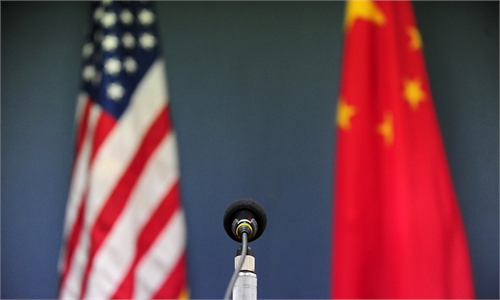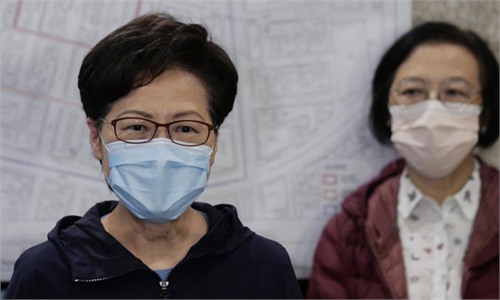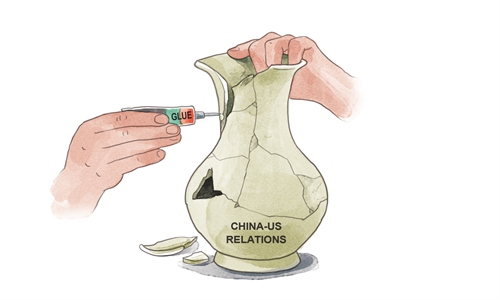China signals compartmentalizing trade from politics with US
Opportunity exists for Biden to seek cooperation despite differences

File Photo
China on Tuesday struck a notably positive tone over economic and trade issues with the US, with the country's top diplomat reiterating China's openness to US businesses and broader cooperation, as the new US administration maintains a tough tone but apparently faces pressure from US companies to repair fraught relations made by former president Donald Trump.In a high-profile speech on China-US relations, Yang Jiechi, director of the Office of the Central Commission for Foreign Affairs, signaled that trade issues could be compartmentalized from political disputes, which is also in line with China's overall foreign policy stance of managing differences while seeking common ground.
That could be a realistic and promising path for the two countries to start to untangle a complex set of troubles in the bilateral relationship, which hit rock bottom under Trump, as trade and economic cooperation has been a bright spot, even during such a tough time, analysts noted.
"On trade, China stresses that trade issues should not be politicized, and the concept of 'national security' should not be abused," Yang said in a speech to the National Committee on US-China Relations.
Yang also said that China always welcomes US investment, while calling on the US to also provide a fair, open and non-discriminatory environment for Chinese companies.
"China is ready for closer macroeconomic policy coordination and more cooperation with the United States to keep the global industry and supply chains safe, and to maintain global economic and financial stability," Yang said.
Yang's speech has been viewed as a window into China's stance on China-US relations going forward, as US President Joe Biden takes over the White House. While China has been consistent in its stance, the overall positive tone suggests expectations for constructive engagement with the new US administration, particularly in trade, analysts said.
"China has always been very clear about its willingness for positive cooperation. But in light of the change of leadership in the US, this could also set the stage for some constructive dialogue," Huo Jianguo, vice chairman of the China Society for World Trade Organization Studies, told the Global Times on Tuesday.
Huo said that Biden faces intense domestic pressure, particularly from the US Congress to maintain a tough posture toward China, but for Biden to achieve some of his top priorities, including returning to multilateralism and reviving the US economy, he must also clear away some of Trump's toxic legacy.
"While difficult, there are some opportunities to [at least start dialogue]," he said.
While Biden is under pressure to be tough on China, he is also facing mounting pressure from many US businesses to reverse trade actions by his predecessor.
Reuters reported on Tuesday that after the US Treasury Department temporarily delayed a ban on investments in companies that the US deemed to have links to the Chinese military, US investors complained that they were left in limbo, with many complaining the US sanctioning measures will only hurt US investors.
There is rising criticism for Trump's punitive tariffs imposed on Chinese goods. A report on news website Axios on Monday noted that tariffs not only hurt US businesses and workers, but drive up prices, and expectations for inflation are starting to rise. Some 3,500 US companies have filed lawsuits against the US government over Trump's trade tariffs.
Gao Lingyun, an expert at the Chinese Academy of Social Sciences in Beijing, said that while pressure is building on Biden to remove those tariffs, the new US administration is unlikely to make any move shortly, because his focus is still on domestic efforts to combat the pandemic, while his trade team has not been set up completely.
"They are saying they will conduct a review of trade policies. That means they will take some time to go over things before making a decision," Gao told the Global Times on Tuesday.
However, economic and trade issues are areas where the two governments can find their biggest common ground, especially as the US economy continues to struggle under the COVID-19 pandemic and some businesses remain reliant on the Chinese market, analysts noted.
Yang pointed out that China-US cooperation has remained robust, with two-way trade in goods expanding by more than 8 percent to reach $580 billion in 2020.
More than 91 percent of US companies surveyed by the US-China Business Council in 2020 said their China operations were profitable and 87 percent said they had no plans to shift production out of China.
Highlighting the trend was a recent industry report from IDC, which showed that Apple was the only one in the top five smartphone brands, including Huawei and Xiaomi, to record growth of 10.1 percent in China market in 2020.
"The fact is, our two countries' economic cooperation and trade have continued to grow against the headwinds," Yang said.




